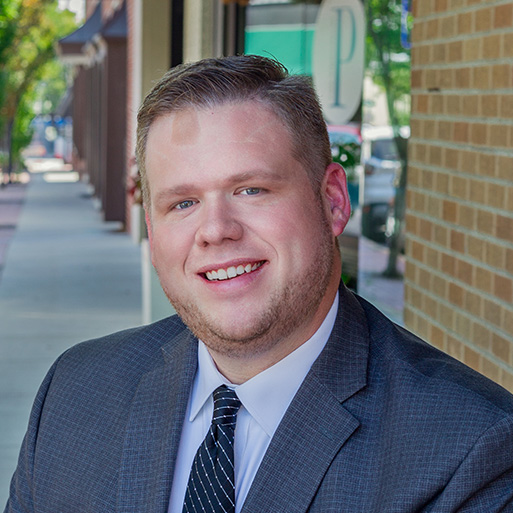Digital Assets Need To Be Protected in Estate Plans
Benjamin E. Long: Attorney Focused on Digital Asset Estate Planning
Benjamin E. Long is a pioneering attorney at Schlagel Long, LLC, specializing in estate planning and probate law with a unique focus on digital assets. With the rise of online life, especially in light of recent global events, Ben understands the critical need to include digital assets in estate planning. His expertise extends to managing digital footprints, ensuring both financial and sentimental digital assets are protected.
Professional Expertise and Education
Benjamin graduated with a J.D. from Washburn University School of Law, earning a Certificate in Advocacy and inducted into the Order of the Barristers for his exceptional skills in oral and written advocacy. Prior to law school, he obtained a B.S. in Biology from Kansas State University. His academic background is supplemented with a practical understanding of the digital world, making him a proficient advisor for modern estate planning needs.
Recognition and Contributions
A recipient of the Super Lawyer Rising Star award and the Martindale-Hubbell Client Distinction award, Benjamin is recognized among the top 2.5% of attorneys. He contributes to the legal community by teaching at Washburn Law School and coaching the Kansas State University Mock Trial Team. His legal acumen is augmented by his membership in the American Bar Association, Kansas Bar Association, and the Johnson County Bar Association. He is admitted to practice in the U.S. District Court District of Kansas since 2011.
Specialization in Digital Asset Planning
Benjamin's approach to estate planning is comprehensive, considering not just tangible assets but also digital ones, like cryptocurrencies, loyalty points, online accounts, and digital business assets. He provides guidance on navigating the complex legal landscape of digital assets, including issues of privacy, cybersecurity, and adhering to various Terms of Service Agreements. His method involves personalized solutions, acknowledging each client's unique digital legacy and privacy concerns.
Personal Life
Based in Olathe, Kansas, Benjamin balances his professional life with time spent with his family. His community involvement and personal interests add depth to his understanding of the diverse needs of his clients.

Digital Assets and Estate Planning
“The proliferation of digital footprints in our online communities raise demand for consumer tools and options for dealing with digital assets upon incapacity and death.”
Most people have an extensive network of digital relationships with retailers, financial institutions and even government agencies. Companies and institutions, from household utilities to grocery delivery services have invested millions in making it easier for consumers to do everything online—and the coronavirus has made our online lives take a giant leap.
As a result, explains the article “Supporting Your Clients’ Digital Legacy” from Bloomberg Tax, practically all estates now include digital assets, a new class of assets that hold both financial and sentimental value.
The Importance of Planning for Digital Assets
Dealing with Digital Assets Upon Incapacity or Death
There are a number of laws that could impact a user’s digital estate during life and death. Depending upon the asset and how it is used, determines what happens to it after the owner dies. Fiduciary access laws outline what the executor or attorney is allowed to do with digital assets, and the law varies from one country to another. In the US, almost all states have adopted a version of RUFADAA, the law created by the U.S. Uniform Law Commission. However, all digital assets are also subject to the Terms of Service Agreement (TOSAs) that we click on when signing up for a new app or software. The TOSA may not permit anyone but the account owner to gain access to the account or the assets in the account.
Navigating the Legal Landscape of Digital Assets
Digital assets are virtual and may be difficult to find without a paper trail. Leaving passwords for the fiduciary seems like a simple solution, but passwords don’t convey user wishes. What if the executor tries to get into an account and is blocked? Unauthorized access, even with a password, is still violating the terms of the TOSAs.
People need to plan for digital assets, just as they do any other asset. Here are some of the questions to consider:
What will happen to digital assets with financial value, like loyalty points, travel rewards, cryptocurrency, gaming tokens, or the digital assets of a business?
Who will be able to get digital assets with sentimental value, like photos, videos, and social media accounts?
What about privacy and cybersecurity concerns, and identity theft?
What will happen to your digital assets?
Protecting Digital Assets and Addressing Privacy Concerns
Facebook and Google offer Legacy Contact and Inactive Manager, online tools they provide to designate third-party account access. Some, but not many, other online platforms have similar tools in place. The best way, for now, may be to make a list of all of your digital accounts and look through them for death or incapacity instructions. It may not be a complete solution, but it’s at least a start.
Reference: Bloomberg Tax (April 10, 2020) “Supporting Your Clients’ Digital Legacy”
Posts About Digital Assets

Estate Planning Legacy Planner
Everyday, we work with people who have lost someone they care about. There is so much these folks have to organize and manage. This planner organizes the information they will most need, in our experience, saving so much time and unnecessary cost. Besides organizing your information, it's so important to have a good estate plan that will keep your family out of court and conflict.
Please use the button below to receive a free copy of our Estate Planning Legacy Planner, an organization tool essential to any estate plan designed to help your loved ones take care of you and handle your affairs.
